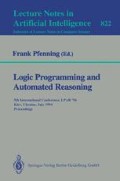Abstract
In his paper [12] Ross extends the well-founded semantics for normal logic programs [16] to disjunctive logic programs. His definition is top-down and it is closer to a procedural semantics than to the elegant fixpoint definition of the well-founded semantics for normal logic programs. In the present paper, we propose a declarative, bottom-up fixpoint definition of the well-founded semantics for disjunctive logic programs. Our construction of the greatest unfounded set of extended literals is similar with the construction of the greatest unfounded set for normal programs. As a consequence, the connection between the well-founded semantics for normal programs and the well-founded semantics for disjunctive programs is made clearer.
Preview
Unable to display preview. Download preview PDF.
References
K. R. Apt, H. Blair and A. Walker. Towards a Theory of Declarative Knowledge. In J. Minker, editor, Foundations of Deductive Databases and Logic Programming, pages 89–104, Los Altos, Ca, 1988. Morgan Kaufmann.
F. Fages. A New Fixpoint Semantics for General Logic Programs Compared with the Well-Founded and the Stable Model Semantics. In D. H. D. Warren and P. Szeredi, editors, Seventh International Conference on Logic Programming, 1990, pages 442–458.
M. Gelfond and V. Lifschitz. The Stable Semantics of Normal Logic. Programs. In K. Bowen and R. A. Kowalski editors, Fifth International Conference on Logic Programming, 1988, MIT Press.
J. W. Lloyd. Foundations of Logic Programming, second edition, Springer-Verlag, 1987.
J. Minker. On Indefinite Databases and the closed world assumption. In Proc. Sixth Conference on Automated Deduction, pages 292–308. Springer-Verlag, 1982.
J. Minker and A. Rajasekar. Disjunctive Logic Programming. In Sixth International Conference on Logic Programming, 1989, MIT Press.
J. Minker, A. Rajasekar. Stratification Semantics For Normal Disjunctive Logic Programs. In E. Lusk, R. A. Overbeek, editors, Proceedings of the North American Conference on Logic Programming, 1989, MIT Press.
J. Minker and A. Rajasekar. A Fixpoint Semantics for Disjunctive Logic Programs. Journal of Logic Programming, 9:45–74, 1990.
T. Przymusinski. On the Declarative Semantics of Deductive Databases and Logic Programs. In J. Minker, editor, Foundations of Deductive Databases and Logic Programming, pages 193–216, Los Altos, CA, 1988, Morgan Kaufmann.
T. Przymusinski. Three Value Stable Semantics For Disjunctive Logic Programs. In D. H. D. Warren and P. Szeredi, editors, Seventh International Conference on Logic Programming, 1990, pages 459–477, MIT Press.
T. Przymusinski. Stationary Semantics For Disjunctive Logic Programs. In S. Debray and M. Hermenegildo, editors, Proceedings of the North American Conference on Logic Programming, 1990, MIT Press.
K. A. Ross. The Well Founded Semantics for Disjunctive Logic Programs. In W. Kim, J.-M. Nicolas and S. Nishio, editors, Deductive and Object-Oriented Databases, pages 385–402, Elsevier Science Publishers B. V. (North-Holland), 1990.
K. A. Ross and R. Topor. Inferring Negative Information from Disjunctive Databases. Journal of Automated Reasoning, 4:397–424, 1988.
J. D. Ullman. Bottom-up Beats Top-down for Datalog. In Proceedings of the 8th ACM Symposium on Principles of Database Systems (1989), pages 140–149.
A. Van Gelder. The Alternating Fixpoint of Logic Programs with negation. In J. Minker, editor, Foundations of Deductive Databases and Logic Programming, Los Altos, CA, 1988, Morgan Kaufmann.
A. Van Gelder, K. A. Ross, and J. S. Schlipf. The Well-Founded Semantics for General Logic Programs, JACM, 38, 3 (1991), pages 620–650.
Author information
Authors and Affiliations
Editor information
Rights and permissions
Copyright information
© 1994 Springer-Verlag Berlin Heidelberg
About this paper
Cite this paper
Papp, C. (1994). A bottom-up reconstruction of the well-founded semantics for disjunctive logic programs. In: Pfenning, F. (eds) Logic Programming and Automated Reasoning. LPAR 1994. Lecture Notes in Computer Science, vol 822. Springer, Berlin, Heidelberg. https://doi.org/10.1007/3-540-58216-9_41
Download citation
DOI: https://doi.org/10.1007/3-540-58216-9_41
Published:
Publisher Name: Springer, Berlin, Heidelberg
Print ISBN: 978-3-540-58216-8
Online ISBN: 978-3-540-48573-5
eBook Packages: Springer Book Archive

